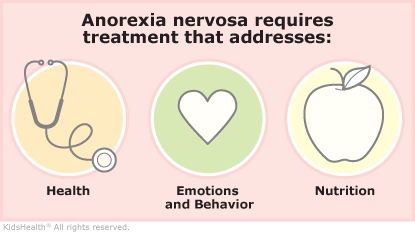- Parents Home
- Para Padres
- A to Z Dictionary
- Allergy Center
- Asthma
- Cancer
- Diabetes
- Diseases & Conditions
- Doctors & Hospitals
- Emotions & Behavior
- First Aid & Safety
- Flu (Influenza)
- Food Allergies
- General Health
- Growth & Development
- Heart Health & Conditions
- Homework Help Center
- Infections
- Newborn Care
- Nutrition & Fitness
- Play & Learn
- Pregnancy Center
- Preventing Premature Birth
- Q&A
- School & Family Life
- Sports Medicine
- Teens Home
- Para Adolescentes
- Asthma
- Be Your Best Self
- Body & Skin Care
- Cancer
- Diabetes
- Diseases & Conditions
- Drugs & Alcohol
- Flu (Influenza)
- Homework Help
- Infections
- Managing Your Weight
- Medical Care 101
- Mental Health
- Nutrition & Fitness
- Q&A
- Safety & First Aid
- School, Jobs, & Friends
- Sexual Health
- Sports Medicine
- Stress & Coping
A to Z: Anorexia Nervosa
May also be called: Anorexia
Anorexia nervosa is an eating disorder that causes people to obsess over food intake, eat as little as possible, and lose more weight than is considered healthy for someone of their age and weight.
More to Know
People with anorexia nervosa have an extreme fear of weight gain and a distorted view of their body size and shape. As a result, they strive to maintain a very low body weight through dieting, fasting, or excessive exercise. The causes of anorexia aren't entirely clear, but a combination of psychological, genetic, social, and family factors are thought to be involved.
Many kids and teens with anorexia — which often develops between the ages of 11 and 13 — have low self-esteem, and their focus on weight can be an attempt to gain control at a time when their lives feel more out of control.
Anorexia causes the body to go into starvation mode, which can lead to serious and potentially life-threatening health problems. Complications include a drop in blood pressure, pulse, and breathing rate; brittle bones and swollen joints; abnormal electrolytes; heart problems; and anemia.
Treatment focuses on coping with disordered eating behaviors and establishing new patterns of thinking about and approaching food. This can involve medical supervision, nutritional counseling, therapy, and possibly hospitalization if the person with anorexia is severely malnourished.

Keep in Mind
Dealing with anorexia nervosa can be hard and may require long-term treatment, but many people with the disorder make a full recovery. In general, the earlier the intervention (ideally before malnutrition starts), the shorter the treatment required.
All A to Z dictionary entries are regularly reviewed by KidsHealth medical experts.

© 1995- The Nemours Foundation. KidsHealth® is a registered trademark of The Nemours Foundation. All rights reserved.
Images sourced by The Nemours Foundation and Getty Images.